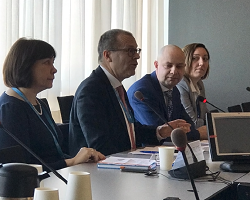Standing up for health for all

WHO
Dr Hans Kluge, the new WHO Regional Director for Europe, opened a country briefing yesterday to showcase collaboration between the Ministry of Health of Lithuania and the WHO Country Office in Lithuania. The briefing took place during WHO’s Executive Board meeting in Geneva, Switzerland. WHO/Europe has provided such briefings at several recent governance meetings in order to increase Member States’ understanding of WHO’s work and impact at the country level.
In recent years, Lithuania has seen progress on a range of health matters, from a reduction in the cost of medicines to the promotion of better nutrition and mental health with support from WHO.
Dr Kluge commended Minister of Health Professor Aurelijus Veryga for pursuing these vital policies, particularly in alcohol- and tobacco-control measures, medicine reimbursement policies, and reforms to the governance of health-care institutions.
Reduction in costs and improved lifestyle
Following reforms, Lithuania has already seen a reduction in the cost of medicines, with patient copayments falling from 20.6% to 6.56% between 2012 and 2019. This means fewer people are at risk of experiencing financial hardship after using health services.
The Ministry of Health recently moved to ensure that the nutrition of patients and pupils is a high priority. In addition, fitness in schools is being promoted and a limit is being placed on the amount of trans fats in foods on the Lithuanian market.
Support for mental health has been boosted, including the allocation of 2.5 million euros in state grants to municipalities to build public health bureaus with a specific focus on mental health.
These reforms are already yielding improvements in health across Lithuania. They seek to reduce the number of deaths from heart attacks by a third, from strokes by a quarter and from suicide by a third while reducing the overall number of deaths by 350 per year.
Putting countries at the centre
This briefing offered an opportunity to better understand WHO’s work in a high-income country, and to bring a Baltic perspective to WHO’s work in the European Region.
Dr Kluge pointed to how the briefings allow Member States to understand WHO’s work at the country level. This forms an important part of WHO’s Thirteenth General Programme of Work (GPW13) and is key to Dr Kluge’s plans for a European Programme of Work – “United action for better health” – which would emphasize country impact.
Country briefings have taken place during previous Executive Board meetings and the World Health Assembly. These have focused on WHO’s collaboration with ministries in Georgia, Romania and Turkmenistan, and with the South-eastern Europe Health Network.



